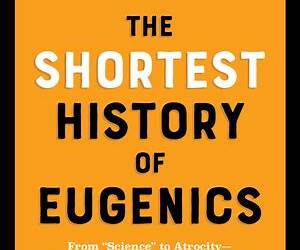A harrowing history of a grim chapter in politics and science in which groups of influential thinkers shaped global policy with the aim of determining who had the right to have children and who was worthy of life For the last two centuries groups of influential men have in the professed interest of fiscal responsibility crime reduction and outright racism attempted to control who was allowed to bear children Their efforts eugenics characterize a movement that over the last century swept across the world from the US to Brazil Japan India Australia and beyond in the form of marriage restrictions asylum detention and sterilization campaigns affected millions German physicians and scientists adopted and then heightened these eugenics practices beginning in 1939 starving or executing those they deemed life unworthy of life But well after the liberation of Nazi deathcamps health care workers and even the US government pursued policies worldwide with the express purpose of limiting the reproduction of poor non whites The Shortest History of Eugenics takes us back to the founding principles of the movement revealing how an idea that began in cattle breeding took such an insidious turn and how it lingers in rhetoric and policy today The Shortest History books deliver thousands of years of history in one riveting fast paced read The Shortest History of Eugenics From Science to Atrocity How a Dangerous Movement Shaped the World and Why It Persists The Shortest History Series The shortest review of The Shortest History of Eugenics is exactly what it says on the tin. The book is a history of eugenics starting with references from ancient history and ending well it does not end The book makes it a point to detail the ways in which eugenics or eugenics inspired theories exist in contemporary political and social discussion It is a brief introduction I keep wondering if shortest is a pun out of necessity of covering 2500 years of history It is also brief because eugenics itself is a protean figure Think for instance if you were writing the history of light The book could discuss physics the eye astronomy art theory yet eugenics is still worse for having not only science but pseudoscience The author makes a pair of good choices in terms of presenting a satisfying arc The first is in focusing on biographies of the proponents throughout the years This helps the reader have something concrete to hold to as the modalities change and it provides humanization without rationalization The second is in stressing the trend of the history from positive to negative Not in a moral sense it is all evil but in a methodological sense of eugenicists trying to breed the good shifting to sterilization or genocide of the bad Its brevity is weakness and strength It is necessarily short to be an overview but at points that becomes elision for instance in dealing with genetics pre re discovery of Mendel the subject of a great public science series I am less worried about this in the abstract of the book as foundational education as I am in thinking about where our current supporters of Eugenics or I Can t Believe It s Not Eugenics supporters would criticize the text on The same goes for some of the melodrama in the writing It is justified on the basis of the material contra the chapter titles where an editor ought to have stepped in or if an editor did step in find a new career but I feel that the persuasive value is less than the risk of tone policing So while this should be looked at as of a springboard to further reading it does not profess to be anything else and does that job well The book is a reminder of how far we have not come how bad so many otherwise decent people were and as an adjunct to many other intellectual histories that glues ideas together. My thanks to the author Erik Peterson for writing the book and to the publisher The Experiment for making the ARC available to me English
| The Shortest History of Eugenics: From “Science” to Atrocity―How a Dangerous Movement Shaped the World, and Why It Persists (The Shortest History Series) By Erik L. Peterson |
| 189101188X |
| 9781891011887 |
| English |
| 304 |
| Paperback |
 .
.